About
MAD-FACTS, or Moms and Dads: Family Awareness Cancer Threat Spike, is a group of residents and families from Washington and Greene Counties impacted by the natural gas industry. Without changes to Pennsylvania law, more families will suffer. Rates of asthma and cancer will only increase. MAD-FACTS advocates for greater protections against the natural gas industry until no more neighbors and family members experience the consequences of living near the infrastructure.
About Us
Timeline
August 2023
The DOH and Pitt held a public meeting and released the studies results (Public Source)
May 2023
During the DOH’s quarterly meeting with Physicians for Social Responsibility and the Environmental Health Project, DOH staff share that they and the University of Pittsburgh intend to hold a community meeting on the research on June 5, 2023, pending venue availability, and there will be a media advisory and information on the DOH website about it (Environmental Health Project).
February 2023
During the DOH’s quarterly meeting with the Environmental Health Project and Physicians for Social Responsibility, the DOH shares that it may hold the meeting in March, but cannot commit because Pitt researchers are still working on the study summary documents, which would need to be completed first (Environmental Health Project).
November 2022
During the DOH’s quarterly meeting with the Environmental Health Project and Physicians for Social Responsibility, the DOH shares that the University of Pittsburgh researchers sent draft reports to the DOH that week, and that the DOH was reviewing. DOH staff say they are working with venues to hold a public meeting to discuss findings of the studies during the week of December 12-16, 2022 (Environmental Health Project).
October 2022
Non-profit groups hold the public meeting, despite the fact that the University of Pittsburgh and DOH pulled out (State Impact).
September 2022
State Senator Camera Bartolotta sends a letter urging the Department of Health to pull out of the community meeting, due to its connection with non-profit groups (State Impact).
The University of Pittsburgh and the Department of Health pull out of the public meeting, citing the fact that study results are not available (Allegheny Front).
Four members of the External Advisory Board resign their positions largely due to that decision and cite the resistance they felt to promoting accountability and transparency in the research process (Center for Coalfield Justice).
The University of Pittsburgh posts its quarterly update, and shares that for the cancer study, data analyses will be completed shortly, and researchers will complete writing all reports in the final quarter of study progress. For the asthma and birth cohort studies, researchers are completing statistical analyses and writing the report of the results. This was the last update they posted, and as of July 2023, the University still had not published Q4 2022, Q1 2023, or Q2 2023 updates (Pitt).
August 2022
External Advisory Board Meeting #5
The University of Pittsburgh and DOH meet with members of the External Advisory Board to plan a community meeting for October 5th, 2022 to update residents on the study’s progress, and non-profit groups (who have staff members on the External Advisory Board) begin to conduct outreach for the event (FracTracker Alliance).
During the DOH’s quarterly meeting with the Environmental Health Project and Physicians for Social Responsibility, the DOH confirms that it will have staff at the October 5th meeting to answer questions along with the University of Pittsburgh researchers (Environmental Health Project).
April 2022
External Advisory Board Meeting #4
Dr. Duckett, Air Quality Technical Advisory Committee with the DEP is added to the board
Dr. Logan Spector presents birth outcome health study
January 2022
External Advisory Board Meeting #3
David Allard presents overview of DEP’s TENORM study: This is right after Public Herald publishes article criticizing that study.
- EAB brings that study to the attention of the study team
November 2021
External Advisory Board Meeting #2
- David Allard, (then) Director of the PA DEP Bureau of Radiation Protection, joins EAB
- Study website becomes live: https://paenv.pitt.edu/
- Discussion of EAB questions
- Our big concerns were around the study including fracking waste exposure data and water pollution data, and how cancer cases were determined/the limitations of the PA Cancer Registry
- We learn that the study designs were already determined for approval by the IRB (Institutional Review Board) and that the EAB is for discussions of small modifications and exposure metrics/data sources
August 2021
External Advisory Board Meeting #1
- EAB Introductions and appoint co-chairs
- Background on the health studies:
1) CANCER: Case-control study using health records and interviews to examine possible associations of Ewing’s sarcoma and other childhood cancers with environmental exposures (oil and gas and other), diagnosed 2010-2019
2) ASTHMA: Uses medical records only to study associations between asthma (prescriptions, hospitalizations) and environmental exposures (oil and gas and other) 2011-2020
3) BIRTH OUTCOMES: Uses medical records only to study associations between birth outcomes (weight for term babies, Apgar score, preterm birth, small for gestational age) and environmental exposures (oil and gas and other) 2010-2020
Region: Allegheny, Armstrong, Beaver, Butler, Fayette, Greene, Washington, and Westmoreland
July 2021
DOH acting Secretary Allison Beam and colleagues visit Southwestern PA and attend a frackland tour.
“PA DEPARTMENT OF HEALTH MEETS WITH FAMILIES WHOSE CHILDREN HAVE BEEN IMPACTED BY RARE CANCERS”
“In a further effort to encourage the Department of Health (DOH) to gain a better understanding of the grief and turmoil among parents and people living in close proximity to fracking development, we asked the DOH to visit the region and meet with impacted families. On Tuesday, July 27th, representatives from the Department of Health including Acting Secretary Allison Beam joined us on a mini-bus tour around parts of Washington County to meet with residents whose children’s health has been impacted by fracking development. Many of the families have participated in research conducted by Kristina Marusic of Environmental Health News, which found that children living near well sites and fracking development had biomarkers in their bodies of harmful chemicals “at levels significantly higher than the average American,” some of which have reached points 91 times higher than the average American.”
June 2021
The University of Pittsburgh’s Graduate School of Public Health is chosen to undertake the studies, which were originally planned to take up to three years to complete.
The University of Pittsburgh sends invitations to various stakeholders to join an External Advisory Board for the research, including health and environmental experts, staff members of non-profit groups (FracTracker Alliance, the Center for Coalfield Justice, and Physicians for Social Responsibility), as well as oil and gas industry-aligned groups such as Shell and American Petroleum Institute, and begins holding meetings with the Board (Pitt).
December 2020
We held a virtual public meeting to update folks on where we were with the DOH campaign.
At this time, public health advocates provided an invitation to Secretary Rachel Levine and the DOH staff members to participate in a town hall regarding the state’s investigation of the health impacts of fracking. Community members in southwestern Pennsylvania are not receiving a response when they reach out to the DOH, nor are public health advocacy groups. The DOH refused to accept the request for implementing an investigations process overview panel and has yet to provide an alternative.
The Wolf Administration awards a $2.5 million contract to University of Pittsburgh to conduct the research (PA).
June 2020
Our health advocacy groups meet with DOH for first time, including Dr. Rachel Levine.
We made guidance requests for how we wanted the study to be conducted including a demand for an advisory board.
Study Overview Process of PA UGD and SWPA Cancer Investigations
November 2019
The Cancer Crisis Coalition arises out of a desire for community members to travel to Harrisburg and tell Governor Wolf to protect our children.
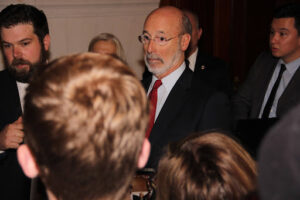
Southwestern Pa. Families Demand Gov. Wolf's Administration Investigate Rare Childhood Cancer
“HARRISBURG, Pa. (AP) — The families of young people diagnosed with a rare childhood cancer confronted Democratic Gov. Tom Wolf on Monday over what they called his administration's insufficient response to a health crisis they blame on pollution from the shale gas industry.”
A few days later, the Wolf Administration announced their commitment to a study.
“Pennsylvania Gov. Tom Wolf said Friday his administration will spend $3 million on a pair of studies to explore the potential health effects of the natural gas industry, taking action after months of impassioned pleas by the families of pediatric cancer patients who live in the most heavily drilled region of the state.”
October 2019
DOH Holds meeting at Canon-McMillan High School
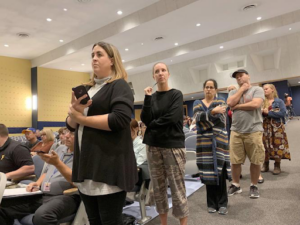
At this meeting, the DOH presented research that had errors in their data that they never updated. They were dismissive of community members, and they showed alarming statistics with little to no context.
“Janice Blanock, who broke down in tears, said, “We don’t know what caused our son’s cancer. However, taking into consideration the high numbers of rare cancers in Washington, Greene, Westmoreland and Fayette counties, 67 in the last 10 years, six of which were Ewing sarcoma cases in the Canon-McMillan School District, it should seem obvious to anyone with an ounce of common sense, sincere heartfelt concern, and true courage, that we need to be looking at environmental issues and triggers. If Gov. Wolf and our state representatives that we elected choose to ignore our pleas for an investigation, there most likely will be long-term negative effects on the health of our children, our grandchildren as well as our communities and the environment.” Continued Blanock, “I’m not a doctor, I’m not a scientist. I’m a mom. Something is wrong. I’m not sure, but they need to do something.”
June 2019
EHP Holds Public Meeting in June of 2019, draws hundreds.
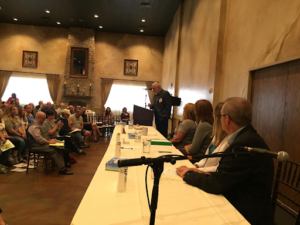
May 2019
The Pittsburgh Post Gazette publishes The Human Toll, an investigation into cancer cases in southwestern Pennsylvania, raising the profile of the issue (PPG).
April 2019
The DOH releases the results of its investigation, announcing that it found no evidence of a cancer cluster for the Ewing’s family of tumors and childhood cancers in Washington County and Canon-McMillan School District, although it did find rates for some types of radiation-related cancer “were somewhat higher than expected.” (DOH).
State Rep. Tim O’Neal hosts a closed door meeting with elected officials, UPMC cancer experts and the Department of Environmental Protection on the issue, which was opened up to impacted families after pressure from advocacy groups like the Center for Coalfield Justice (PPG).
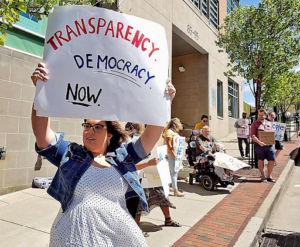
March 2019
March 2019, David Templeton’s story in the PG “Are the 27 Cases of Ewings Sarcoma near Pittsburgh a Cluster?” is released regarding rates of Ewings Sarcoma Cancer in the region.
Community members in the Canonsburg region speak out with concerns as many of Canon McMillan recent alumni, as well as young adults in the area, had been diagnosed with Ewings Sarcoma in a short period of time. Templetons story draws the region together and shows that the issue of ewings sarcoma is not limited to the Canon McMillan school district.
February 2019
WPXI reports on Ewing Sarcoma cases in the Canon McMillan School District, prompting the Pennsylvania Department of Health (DOH) to investigate (WPXI).
Ready to find out more?
Sign up for our email list to receive updates on MAD-FACTS, ways for you to take action, and alerts for upcoming events. When signing up, select that you are interested in MAD-FACTS, as well as how you like to be contacted. After signing up, you'll receive an email confirmation.
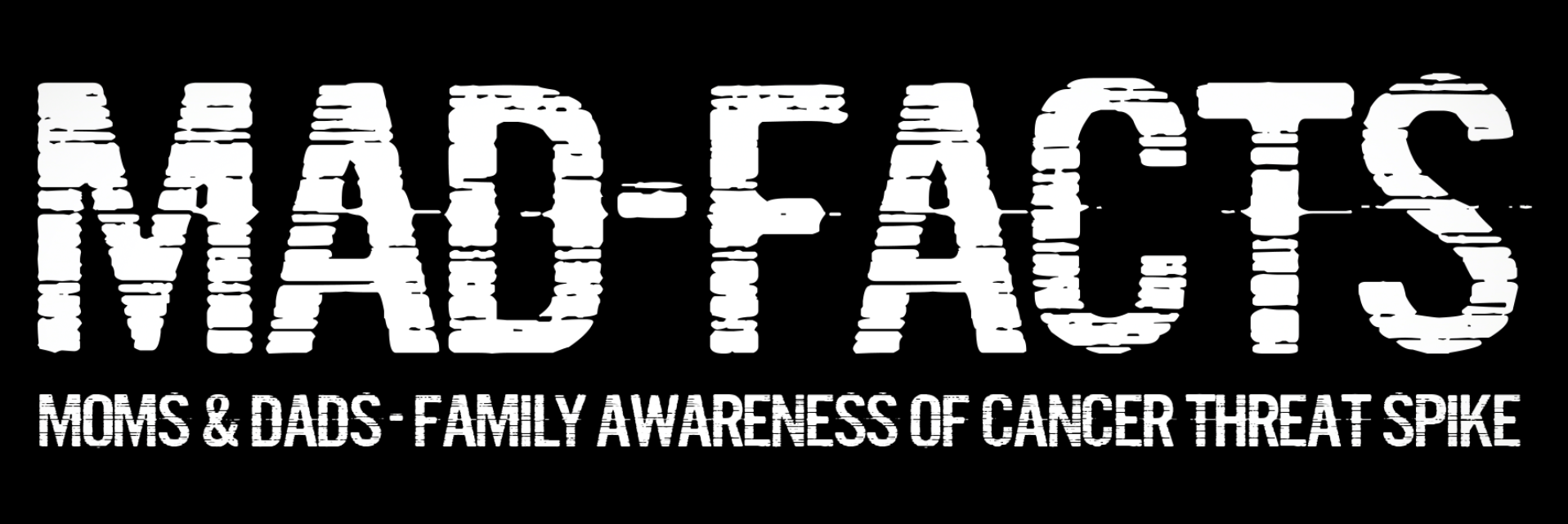
 Jodi Borello is an advocate and grassroots organizer for the Center for Coalfield Justice (CCJ) in Southwestern Pennsylvania. CCJ fights for environmental justice for coalfield communities impacted by extractive industries, including the largest underground coal mine in North America and the more than three thousand fracking wells an
Jodi Borello is an advocate and grassroots organizer for the Center for Coalfield Justice (CCJ) in Southwestern Pennsylvania. CCJ fights for environmental justice for coalfield communities impacted by extractive industries, including the largest underground coal mine in North America and the more than three thousand fracking wells an On August 7, 2016, Janice lost her 19 year old son Luke to a rare and aggressive pediatric bone cancer called Ewing’s Sarcoma, that had also recently taken the lives of several young people in Washington County.
On August 7, 2016, Janice lost her 19 year old son Luke to a rare and aggressive pediatric bone cancer called Ewing’s Sarcoma, that had also recently taken the lives of several young people in Washington County.